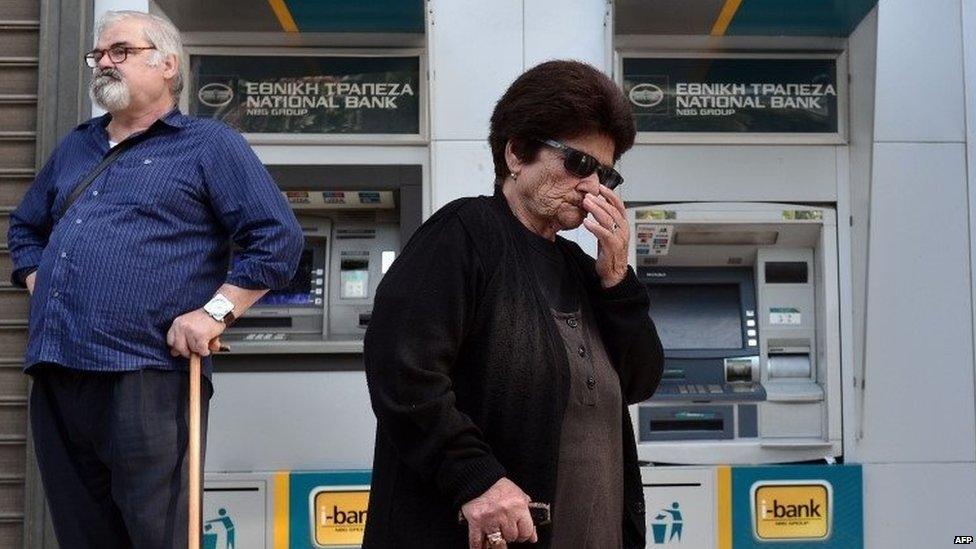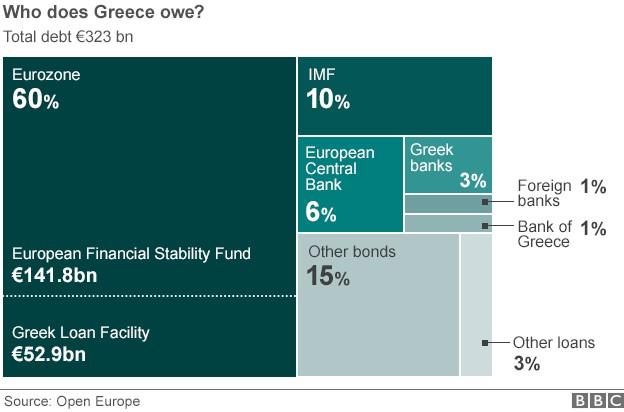Greece debt talks: EU chief feels 'betrayed'
- Published
European Commission chief Jean-Claude Juncker: "In one night Europe suffered a major blow"
The European Commission chief, Jean-Claude Juncker, has said he feels "betrayed" by the "egotism" shown by Greece in failed debt talks.
He said Greek proposals were "delayed" or "deliberately altered" but added the door was still open to talks.
Along with several other European leaders, he has urged a yes vote in the snap referendum called for Sunday.
Global stock markets saw big falls on Monday after the weekend's events which saw Greek banks close for a week.
Mr Juncker said the talks had been broken "unilaterally" by the announcement from the Greek Prime Minister Alexis Tsipras that he was calling a referendum.
The Greek government responded to Mr Juncker's comments by saying: "An essential element in indicating good faith and reliability in negotiations is sincerity."
Despite the public war of words a Greek official said Mr Tsipras had spoken to Mr Juncker on Friday and asked him to extend Greece's bailout until the referendum.
A critical deadline looms on Tuesday, when Greece is due to pay back €1.6bn to the International Monetary Fund - the same day the bailout expires. There are fears of a default and a possible exit from euro.
Mr Juncker said that he still believed a Greek exit from the euro was not an option and insisted that the creditors' latest proposal, external meant more social fairness.
German Chancellor Angela Merkel echoed those comments on Monday, saying Greece had received a "generous offer" but adding she would not be opposed to further talks with Greece after Sunday's vote.
German Economy Minister Sigmar Gabriel said Greek voters would effectively be deciding whether or not they wanted to stay in the eurozone, a view echoed by French President Francois Hollande and Italian Prime Minister Matteo Renzi.
European press sees Greece on verge of exit

Referendum question
The question which will be put to voters on Sunday will not be as simple as whether they want to stay in the euro or not - instead it asks Greeks to approve or reject the specific terms laid out by Greece's creditors:
"Should the agreement plan submitted by the European Commission, European Central Bank and the International Monetary Fund to the June 25 eurogroup and consisting of two parts, which form their single proposal, be accepted? The first document is titled "Reforms for the completion of the Current Program and Beyond" and the second "Preliminary Debt sustainability Analysis."
"Not approved/NO
Approved/YES"

Analysis by the BBC's Chris Morris
It's hard to remember the last time a president of the European Commission used such blunt, undiplomatic and sometimes angry language about the government of a member state.
Jean-Claude Juncker said he felt betrayed, and suggested that Alexis Tsipras was lying to his people about cuts in wages and pensions.
There was no hint of a last minute deal before Greece's current bailout programme expires Tuesday evening.
Instead Mr Juncker appealed directly to the Greek people ahead of the proposed referendum this weekend.
And the message was clear - vote "yes" to our proposals and we'll support you. Vote "no" and you'll probably get kicked out of the euro.
Mr Juncker also said any criticism aimed at him or other senior politicians in the creditor institutions was unjustified.
It was an emotional appeal from the heart.
But it also felt like a pre-emptive effort to make his side of the story public in case this all goes very wrong.

On Saturday, the European Central Bank (ECB) decided not to extend emergency finance to the Greek banks, after the breakdown of talks on giving heavily indebted Greece the last payment of its international bailout.
The current ceiling for the ECB's emergency funding - Emergency Liquidity Assistance (ELA) - is €89bn (£63bn). It is thought that virtually all that money has been disbursed.
Following the ECB announcement, Greece said its banks would remain shut until 6 July. Cash machines are now reopening, but customers can withdraw only limited amounts.
Transport Minister Christos Spirtzis announced that public transport will be free in the Athens area for a week while banks are closed.

Greek cash machines were shut on Monday morning
The French cabinet met on Monday in an emergency session. President Francois Hollande said afterwards that a deal was still possible if the Greeks wanted it.
"There are a few hours before the negotiation is definitively closed, in particular for the prolongation of the Greek aid programme."

'Resorting to barter system'
Greeks in Athens gave the BBC their views on bank closures and the government
Athens resident Ilia Iatrou says the situation is "unbearable".
"My mother-in-law queued up for over an hour at the cash point just to be able to withdraw a small amount of money.
"I haven't tried to go to the cash machine myself, as we don't have much money left.
"My neighbours and I have now resorted to a sort of barter system among ourselves because we have no money left.
"We can't take any more of this, so we have to keep saying no to the EU masters.
"The EU can't afford to let us fail so we should continue to say no and they will blink and give us a better deal."

In its decree bringing in the bank restrictions, the Greek government cited the "extremely urgent" need to protect the financial system due to the lack of liquidity.
The main points are:
Banks closed till 6 July
Cash withdrawals limited to €60 (£42; $66) a day for this period
Cash machine withdrawals with foreign bank cards permitted
Pension payments not part of capital controls
Banking transactions within Greece allowed
The euro lost 2% of its value against the the US dollar in trading on Monday before recovering some ground. Government borrowing costs in Italy and Spain, two of the eurozone's weaker economies, have also risen.
The Athens stock exchange is closed as part of the emergency measures.

Days of turmoil
Friday evening: Greek prime minister calls referendum on terms of new bailout deal, asks for extension of existing bailout
Saturday afternoon: Eurozone finance ministers refuse to extend existing bailout beyond Tuesday
Saturday evening: Greek parliament backs referendum for 5 July
Sunday afternoon: ECB says it is not increasing emergency assistance to Greece
Sunday evening: Greek government says banks to be closed for the week and cash withdrawals restricted to €60

